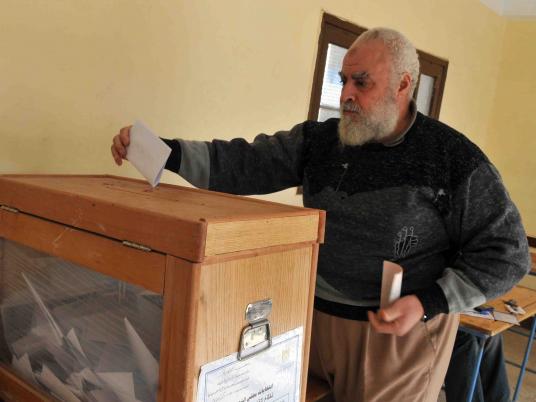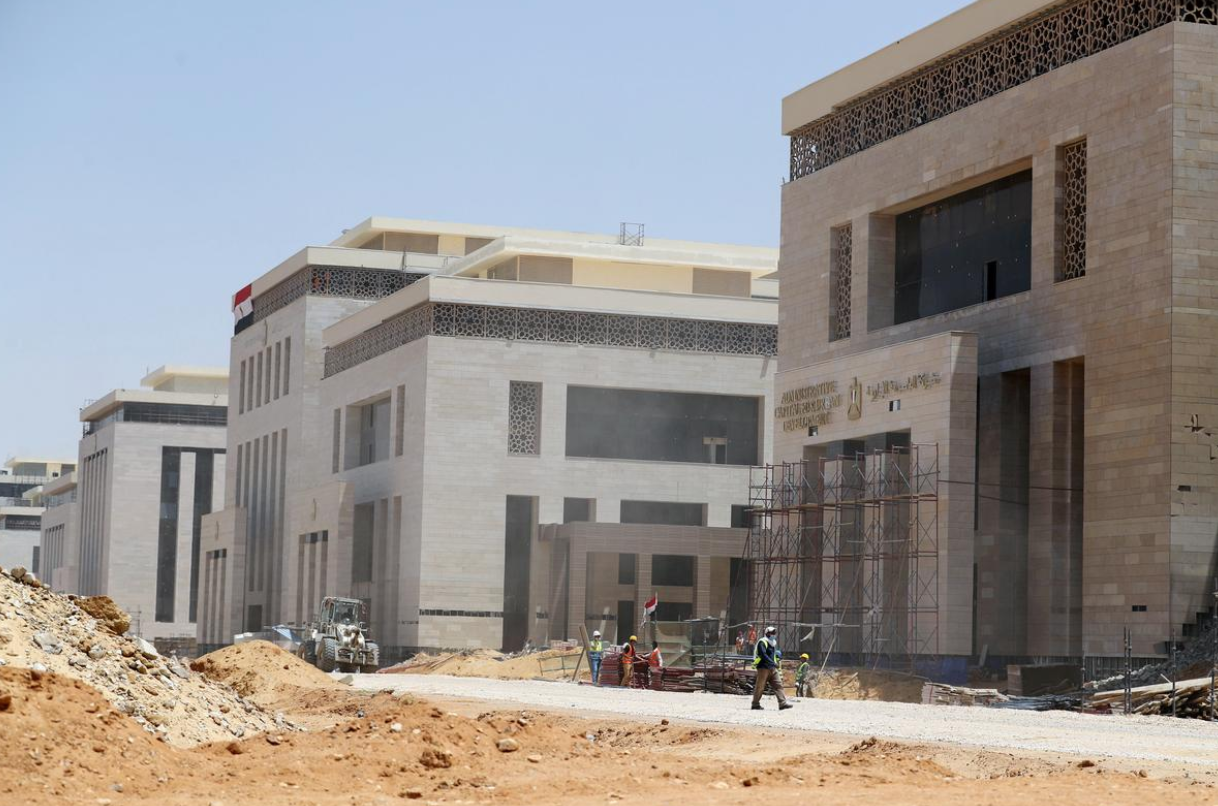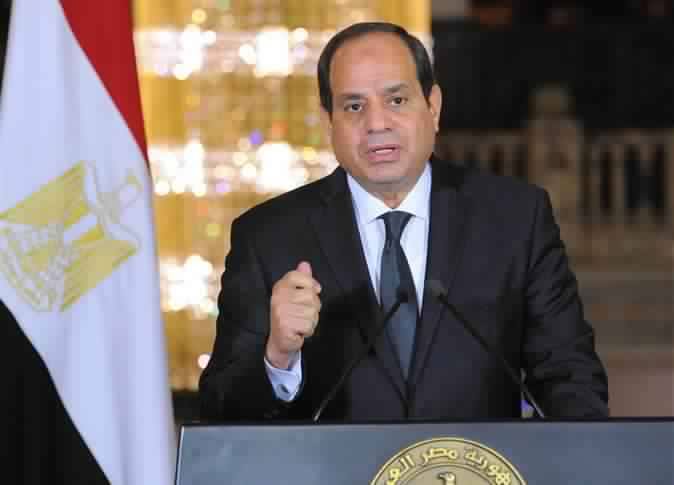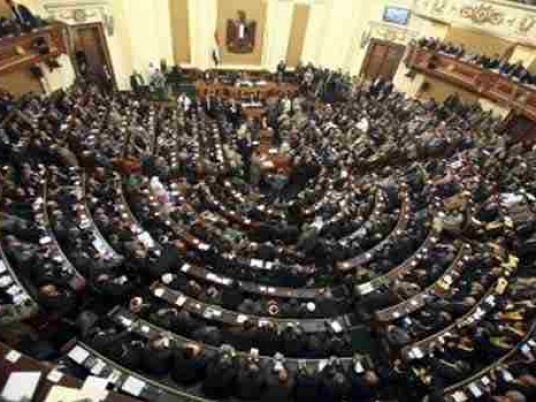
Over the past 60 years, the only use for public opinion polling ahead of presidential election in Egypt would have been to predict how high in 90s the incumbent’s win would be.
But with the first truly competitive presidential election in Egypt’s history days away, citizens, analysts and journalists have been looking to polls with much anticipation — and plenty of skepticism.
Discrepancies in the results of polls conducted in the weeks ahead of the presidential vote and inaccurate projections that they produced ahead of the parliamentary elections show that, while many polling institutions rely on internationally recognized scientific methodologies, polling in Egypt still faces many challenges that it needs to overcome before it generates reliable results.
Accusations of bias
The main institutions conducting regular polling ahead of the presidential elections are the government-financed Al-Ahram Center for Political and Strategic Studies, the Cabinet-affiliated Information and Decision Support Center and a newly established private polling firm called Baseera.
With two of the institutions government-affiliated and the third, Baseera, run by former IDSC head Maged Osman, there have been plenty of conspiracy theories accusing the institutions of fabricating the polls in order to promote their preferred candidates.
In earlier polls, Al-Ahram center put former Foreign Minister Amr Moussa in first place, while Baseera put former Muslim Brother Abdel Moneim Abouel Fotouh at the top.
In the last two weeks, however, Ahmed Shafiq, Mubarak’s last prime minister, has been climbing fast in the polls at the expense of other front-runners. He came in first place in both the latest polls for IDSC and Baseera, and a close second to Moussa in the poll by Al-Ahram center.
The institutions have vehemently denied accusations of manipulating results.
“We are affiliated with the Cabinet, but this doesn’t affect the choice of subject or the polling,” says Sahar Ammar, the head of the IDSC.
Ammar says that these allegations are only surfacing because people are not yet accustomed to the culture of polling, and they tend to reject results that don’t match their hopes or expectations.
Because of these doubts, others have decided to conduct their own polls.
Independent Al-Shorouk newspaper conducted two polls, the latest published on Sunday, which similarly put Shafiq in the first place. The paper’s first poll, conducted two weeks earlier, had Abouel Fotouh in the lead and Shafiq in the third place.
“We wanted to give the reader results that we were 100 percent sure of,” said Al-Shorouk editor-in-chief Amr Khafaga.
But just like Baseera, the individual responsible for Al-Shorouk’s poll is a former employee in the IDSC. Moreover, as Khafaga said the outlet depends on one employee to design the poll and the sample and a call center to conduct the interviews, Al-Shorouk poll runs a high risk of inaccuracy. Suspicions about the objectivity of the formal polls are made more serious by the difficulties that independent polling bodies face.
Seif al-Khawanky, founder of Thawra Stats — an independent public opinion polling firm that was formed during the revolution — says the professional, volunteer-based firm has been unable to conduct polls lately because of security interventions.
Khawanky says the group started to carry out periodic public opinion polls since the first Tahrir sit-in, succeeding in providing the most accurate polls ahead of the constitutional referendum in March.
Since then, he says, security started to intervene every time the group tried to conduct its field interviews, forcing them to stop their activities temporarily.
Flaws in methodology
Mohamed Younis, a senior analyst at Gallup, one of the US’s most renowned polling firms, sees the institutions conducting polling in Egypt as promising.
“The main challenge I see now is that many organizations that are just entering the polling sphere don’t bring a lot of experience to the practice. What is promising is that many of these organizations in Egypt are learning, emulating and in some cases perfecting what is done globally by the world’s leaders in this field,” says Younis.
However, when compared to Gallup’s standards, many flaws can be found in that of local firms.
All the local firms announced the same basic methodology, which is also the one used by Gallup, to produce generally accurate results.
The poll is conducted on a random sample of around 1,000 — more than 2,000 for Baseera — subjects from across the country, and the data obtained is weighted to match the demographical characteristics of Egypt.
One significant difference remains: Al-Ahram center conducts face-to-face interviews, while the other firms depend on landline and mobile phone interviews.
The face-to-face interviews put the firm at the disadvantage of needing five days to finish one poll, while the phone-based polls only take one to two days. This method also excludes five border governorates that the pollsters don’t visit.
On the other hand, while it’s fast and includes all governorates, the phone interviews exclude the sector of society that owns neither landlines nor mobile phones.
Both these methods violate Younis’ rule of thumb for a representative sample: All members of the population must have the same probability of being included in the sample, otherwise the sample is flawed.
“Think of a remote rural village in the countryside and also think of a well-connected, multiple mobile phone and landline phone home, say, in Zamalek. These two households must have an equal chance of being interviewed. Anything the pollster may do to compromise the chance of equally interviewing both of these types of households could affect the validity of your sample,” Younis explains.
While it uses phone interviews in the US, where there is widespread phone access, Gallup relies only on face-to-face in home interviews on a sample of 1,000 in Egypt in its polls because of limited phone access in the country, says Younis.
Even when the sample is chosen correctly, there is room for mistakes that can lead to inaccurate results.
The contentious political atmosphere in Egypt leads to a high risk of what Younis explains as a non-response error, which occurs when holders of a certain view are more likely to refuse to respond, making this view underrepresented in the sample.
Revolutionaries judge those voting for members of the old regime, liberals oppose those voting for Islamist candidates and vice versa —so there’s a high risk that holders of unpopular opinions would hide it from pollsters.
Another factor that may have led to inaccurate results in local polls is measurement error, which occurs because of bad questions or interviewer bias.
Many of the polls fell in the trap of posing leading questions. Younis says that it is crucial to offer the interviewer balanced options in the question, for example “Do you approve or disapprove of …?”
Instead, most published polls asked one-sided questions such as “Do you support the revolution?” or “Will you vote in the elections?” which could lead the respondent to answer positively.
Other processing errors could occur because of unintended mistakes in any of the phases of the poll.
The results of the pre parliamentary elections polls don’t inspire much confidence. Both the Ahram center polls and IDSC polls proved far off the mark, especially regarding the Salafi win.
In November, Al-Ahram gave the Salafi Nour Party 8.4 percent, while the Cabinet center gave it 2 percent. The party won an unpredicted 23 percent in the elections a month later. At the time, Baseera and Al-Shorouk paper hadn’t entered the polling field yet.
Challenging political atmosphere
In the fast-changing political atmosphere in Egypt where game-changing developments occur on daily basis, it is difficult to capture the constantly changing public opinion.
Up until the final list of candidates was announced in late April, new candidates were introduced and others were disqualified frequently, sometimes as a poll was taking place. Also, political events and media statements of the candidates caused sharp changes in their popularity.
Younis says that in general and especially in these fluid conditions, the polling activity should focus on trends rather than the result of one single poll. One single poll, however accurate, is like “taking one snapshot in a moving dynamic,” he says.
Ahead of the US presidential elections, Gallup interviews 1,000 households every night for a whole year to reach accurate trend data.
Because it hasn’t conducted frequent polls in Egypt since February, Gallup has not announced any projections concerning the upcoming election. Its most recent poll announced last weekend only indicated a decline of Islamists’ support.
The local polling has deduced trends of candidates’ popularity development over time, but with the most frequent polls taking place weekly, concrete trends have not been reached.
Another challenge is a high level of undecided voters. While they differ in their results, all polls have had more than 20 percent — sometimes more than 30 percent — of voters not yet decided on whom they will vote for. This means that no matter how accurate the poll is, it remains inconclusive.
Diaa Rashwan, the head of Al-Ahram center, said in a recent interview that the indecisiveness and reluctance of the public to say their opinion makes it harder to reach accurate results.
“The accuracy of the results depends on two things: the procedures and the people telling the truth. We do our part but the people are not used to that yet,” said Rashwan.
Dealing with these challenges, experience is not a helping factor either.
Baseera is only months old, but even older institutions such as Al-Ahram, which has had a public opinion unit since 1995, and the IDSC, in business since 2003, are new to this kind of polling.
Ammar admits there were restrictions on the center’s polling before the revolution, limiting its activities to social and economic polls while staying away from controversial political subjects like the ones they deal with now.
Despite its rocky start, Younis sees the diverse polling activity starting to form in Egypt as a crucial element in the success of the next phase of its transformation.
Younis says that during the next phase, where a lot of difficult and maybe unpopular decisions have to be made, public opinion understanding will be crucial for the coming government.
Polls open a much-needed two-way communication line between government and citizens, informing the government of people’s perceptions on various issues and inducing elected officials to respond to public will and pressure, Younis says.
“Without this tool, it’s like driving a car with a blindfold on — except in this car, there are over 80 million people in the passenger seat,” says Younis.




